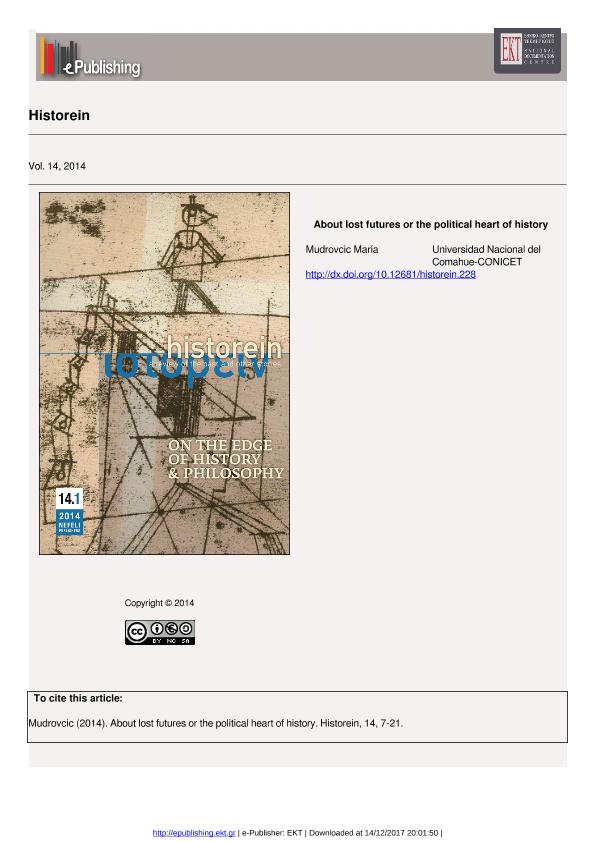Mostrar el registro sencillo del ítem
dc.contributor.author
Mudrovcic, Maria Ines

dc.date.available
2017-12-14T18:03:57Z
dc.date.issued
2014-03
dc.identifier.citation
Mudrovcic, Maria Ines; About lost futures or the political heart of history; Cultural and Intellectual History Society; Historein : a review of the past and other stories; 14; 1; 3-2014; 7-21
dc.identifier.issn
2241-2816
dc.identifier.uri
http://hdl.handle.net/11336/30660
dc.description.abstract
The consideration that our era lives under the sign of memory and that this has become the main concern of culture in western societies is a commonplace. This shift to the past has been described as a “memory boom”,2 a “surfeit of memory”,3 a “world (that is) being musealised”4 and as a “desire to commemorate”.5 This “obses sion with recalls” has been interpreted in many studies: on local, cultural or “from below” mem ories, on ways of keeping memories (from me morials and monuments to files, movies, biog raphies and commemorations, etc), on ways of understanding a historiography that looks back to the recent past, about politics of memory and past uses, among other issues. These studies have multiplied in the most varied disciplines, including, sociology, social psychology, history, psychoanalysis, neurobiology, culture sociolo gy, philosophy, etc. The diagnosis seems to be unanimous: we are living in a period in which the present lives off the past, in a kind of “a present past”,6 with the result that we lapse into what Hartog calls “presentism”. This past that lives in the present has been called “traumatic”,7 “sub lime”,8 “espectral”,9 among others. We are expe riencing a “new order of time”: “D’un coté ... un passé qui n’est pas aboli ni oublié, mais un passé duquel ne pouvons à peu prés rien tirer qui nous oriente dans le present et nous donne à imagi ner le future. De l’autre, un avenir sans la moin dre figure.”10 An order of time which casts doubts on the future understood as progress. It puts in question the modern regime of temporality; “in stead of being oriented towards the future, it is oriented towards the past”
dc.format
application/pdf
dc.language.iso
eng
dc.publisher
Cultural and Intellectual History Society
dc.rights
info:eu-repo/semantics/openAccess
dc.rights.uri
https://creativecommons.org/licenses/by-nc-sa/2.5/ar/
dc.subject
Modernity
dc.subject
Crimes Against Humanity
dc.subject
Memory
dc.subject.classification
Estudios Religiosos

dc.subject.classification
Filosofía, Ética y Religión

dc.subject.classification
HUMANIDADES

dc.title
About lost futures or the political heart of history
dc.type
info:eu-repo/semantics/article
dc.type
info:ar-repo/semantics/artículo
dc.type
info:eu-repo/semantics/publishedVersion
dc.date.updated
2017-09-29T16:33:18Z
dc.journal.volume
14
dc.journal.number
1
dc.journal.pagination
7-21
dc.journal.pais
Grecia

dc.journal.ciudad
Athens
dc.description.fil
Fil: Mudrovcic, Maria Ines. Universidad Nacional del Comahue; Argentina. Consejo Nacional de Investigaciones Científicas y Técnicas; Argentina
dc.journal.title
Historein : a review of the past and other stories
dc.relation.alternativeid
info:eu-repo/semantics/altIdentifier/url/https://ejournals.epublishing.ekt.gr/index.php/historein/article/view/2294
dc.relation.alternativeid
info:eu-repo/semantics/altIdentifier/doi/http://dx.doi.org/10.12681/historein.228
Archivos asociados
